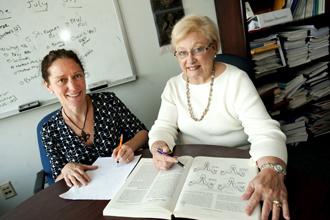Sex Education Goes Online
Tulane University public health experts are devising an online campaign aimed at 18- and 19- year-old African American girls in New Orleans with the goal of preventing unintended pregnancy and promoting personal responsibility. Two-thirds of all teen pregnancies occur in this age category.

Patricia Kissinger, left, and Carolyn Johnson are working together to devise an online program to prevent pregnancy in African American women who are 18 and 19 years old, the most vulnerable age for unintended teen pregnancy. (Photo by Paula Burch-Celentano)
While the rate of unintended pregnancy in the United States has significantly declined among youth in their early teens, it has continued to remain high among women in their late teens, says Patricia Kissinger, professor of epidemiology in the Tulane School of Public Health and Tropical Medicine.
The U.S. Department of Health and Human Services awarded more than $2.7 million for the five-year project led by Kissinger and Carolyn Johnson, professor of community health sciences. Louisiana has the 18th highest teen pregnancy rate and ranks 13th for teen birth rates in the nation.
The 12-week program, which will be known by the acronym BUtiful (Be YOU! Talented, Informed, Fearless, Uncompromising and Loving!), is designed to help young women develop strong self-images and encourage them to set positive goals based on life-affirming values, Johnson says.
Kissinger says most women in this age group have access to computers, making the program easily accessible to the targeted group. “We're excited about it. It's cutting-edge technology, using social media,” she says. “We hope this type of intervention will become the gold standard. The trick will be to make it engaging, interesting and fun so the girls will finish it.”
The team is translating to the Internet format an Emory University program that has proven successful with younger girls. The new modules will be self-paced using a variety of online learning and educational support materials including a blog and interactive activities.
The Tulane public health team plans to call on a community advisory panel with representatives from the targeted demographic group to guide the project. Participants for the panel will be recruited from community-based organizations, schools and training programs.
